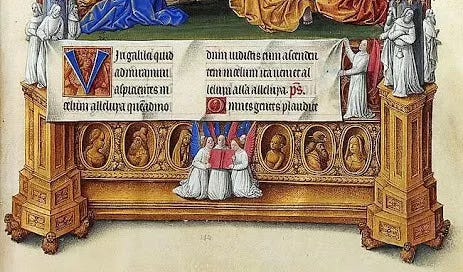Look Up to Him: The Good News of the Ascension
A Glance at Ascension Art & Wisdom from Barth's 1956 Ascension Day Prison Sermon
A joyous Ascension Day to all who celebrate!
The ascension might be the most pivotal yet neglected doctrine related to Christ and his work. It is critical for our salvation and the launching pad for the sending of the Spirit, just to mention two areas of importance.
Even so, ask yourself: how many sermons have you heard about the ascension of Jesus?
Part of the beauty of the church year (shameless plug for my forthcoming book in 2025) is that attention to such transformative truths is not left to chance.
Today, we reflect and rejoice that Jesus died, rose, and ascended to heaven and is seated at the Father’s right hand.
The Ascension as Completion and New Beginning
If you wonder why the ascension matters, simply ask another question: where is Jesus now?
I’m a child of hip-hop culture, and segments of the culture have a soft (blind?) spot for conspiracy theories. I’ve never taken to this phenomenon, but one of the wildest of conspiracy theories is that, get this, Tupac Shakur didn’t really die in 1996.
Where is Tupac now? According to the hair-brained theory, he’s likely posted up in an undisclosed beach location with cigar and beverage in hand. The legend lives. We just don’t know where.
If Jesus did not ascend, then the Risen Lord is somewhere undisclosed on earth. Weird. Unthinkable. And most crucially, unbiblical.
Because Jesus did ascend, there’s a full, effectual dose of good news for us.
Jesus’s ascension means he is not on earth in some undisclosed location or a divine witness protection program—he has returned to God—with nail-scarred hands to be enthroned over all.
Listen to how Bp. Robert Barron puts its:
We can tend to read the Ascension along essentially Enlightenment lines, rather than biblical lines ... that God exists, but that He lives in a distant realm called heaven, where He looks at the human project moving along, pretty much on its own steam, on earth. On this Enlightenment reading, the Ascension means that Jesus goes up, up, and away, off to a distant and finally irrelevant place. But the biblical point is this: Jesus has gone to heaven so as to direct operations more fully here on earth. That’s why we pray, “Thy Kingdom come, thy will be done on earth as it is in heaven.” Jesus has not gone up, up, and away, but rather—if I can put it this way—more deeply into our world. He has gone to a dimension that transcends but impinges upon our universe.
The ascension is less an evacuation and more a coronation. Jesus has left one place/plane to reign over every place/plane.
There is also a deep sense of completion about the ascension.
The ascension completes what started at the incarnation. The Word became flesh, plunging into the abyss of a sin-stricken world. Now, the Word made flesh ascends, having been faithful as our representative, friend, and savior. He returns with the scars of victory upon his flesh.
Jesus ascends to God’s presence, having completed his earthly mission. For nearly three decades, he walked in our humanity. He resisted the lies of the world and the devil. He loved God and his neighbors to the max.
He suffered and died for our sins. And God raised him from the dead. He taught his disciples about the kingdom and gave marching orders to proclaim and serve in his name. And now he ascends to where the Father is as he promises the Spirit.
The ascension means the work of our earthly salvation is complete because Jesus has brought his sacrifice — his very body — before the presence of God in heaven.
The Letter to the Hebrews explains this for us:
After making purification for sins, he sat down at the right hand of the Majesty on high (Heb 1:3)
For Christ has entered, not into holy places made with hands, which are copies of the true things, but into heaven itself, now to appear in the presence of God on our behalf (Heb 9:24)
The ascension connects the cross-resurrection by bringing his saving work done on earth into God's presence in heaven.
Acts 1:1-11 shows that the ascension is tied to Christ’s continued work on earth through his body, the church. It is the ascended Christ who promises the Spirit. Pentecost is promised not only in the upper room (John 14:16) but at Bethany when Jesus ascended (Luke 24:44-53). This means the Ascension is a hinge of completion and a new beginning, the spread of Christ’s gospel across the face of the earth.
The Ascension as Good News to the Captives
Nothing makes truth shine quite like letting it loose in hard places.
If the ascension seems abstract, listen to how Karl Barth, perhaps the most significant 20th-century theologian, preached on Ascension Day to prisoners in Switzerland.
With his trademark Christo-centric verve, Barth demonstrates how we can “look up” to Jesus precisely because he has been taken up":
My dear brothers and sisters, 'Look up to him!' This is what we commemorate on Ascension Day : the urgent invitation, the permission and the command, the freedom we enjoy as Christians and the obedience that is expected from us to look up to him, to Jesus Christ, who lived for us, died and rose again. He is our Saviour who watches over us like an older brother watches over his younger brothers and sisters, yet in his protection is also their example and their master.
Remember when Mary and Martha wanted Jesus to be present in Bethany to look over Lazarus, their dying brother, in John 11? As exalted Lord, Jesus now looks over all with power, intercession, and mercy.
Not only does he look over us in power, we look to him in faith.
For Barth, this means we are to live as if Jesus is interceding for us because he truly is. We look to Jesus, say “yes” to Jesus because he is making all things right:
'Look up to him!' This means : Let him be who he is, above us, in heaven. Acknowledge and believe that he is up there and lives for us! Keep firmly in mind that he intervenes with all his power in your behalf, but keep firmly in mind also that you belong to him and not to yourselves. Say very simply 'yes'. Say that he is right and wants to make things right for you, indeed has already made them right for us all. Is this an exaggerated claim? Has he really made things right for all of us? Even for the most miserable, the most afflicted and the most embittered of human beings? Yes! Even for the most grievous offenders? Yes! Even for the godless-or those pretending to be godless, as may be the case with some of your fellow-prisoners who declined to be with us this morning? Yes! Jesus Christ has made things right for them and for us all. He is willing to do it time and again. To look up to Jesus Christ means to accept his righteousness and to be content; not to question any more that he is right. This is the message of the Ascension : we are invited to look up to him, to this Jesus Christ, or, to use a more familiar expression, to believe in him.
Surely this message was a word on target for those prisoners who heard it. It’s the word we need, too—a word we never mature beyond. Look up to him, the crucified Lord who is the risen Lord, and thanks be to God, the ascended Lord.
Almighty God, whose blessed Son our Savior Jesus Christ ascended far above all heavens that he might fill all things: Mercifully give us faith to perceive that, according to his promise, he abides with his Church on earth, even to the end of the ages; through Jesus Christ our Lord, who lives and reigns with you and the Holy Spirit, one God, in glory everlasting. Amen.
(Collect for Ascension Day, BCP, 1979)
P.S. — If you’re looking for some ways to celebrate the Ascension, Ashley Tumlin Wallace has great insights.





